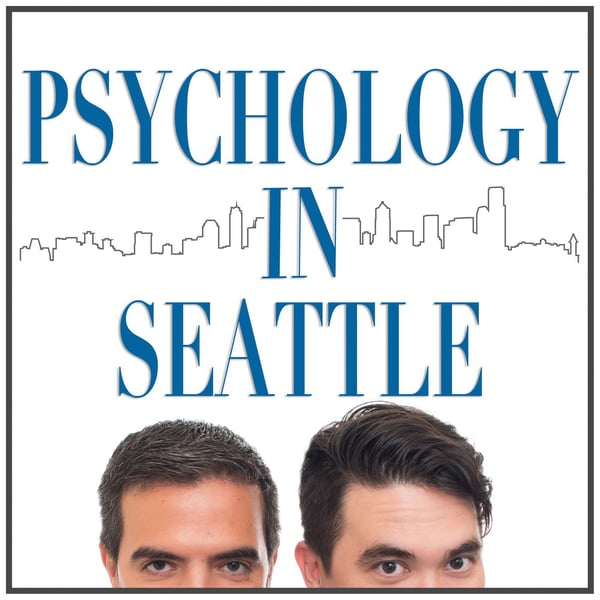Cheating and Codependence
Psychology In Seattle Podcast
Kirk Honda
4.6 • 1.2K Ratings
🗓️ 11 November 2024
⏱️ 72 minutes
🧾️ Download transcript
Summary
This episode is sponsored by BetterHelp. Give online therapy a try at betterhelp.com/KIRK to get 10% off your first month.
00:00 What is Dr. Kirk's model of supervision?
02:07 How do I tell a friend that I have a life-threatening condition?
08:43 Dependent personality spectrum
12:18 Why do I want to cheat?
20:35 OPP 2022
21:30 Psychology "Hacks"
28:03 Grey Rocking
36:25 Mug-level OPP 2022
37:50 Can I report a therapist friend?
41:04 How do I accept an apology?
46:26 What drives the dynamic of an over/underfunctioner relationship?
55:02 How does pressure as a child star impact them?
Become a member: https://www.youtube.com/channel/UCOUZWV1DRtHtpP2H48S7iiw/join
Become a patron: https://www.patreon.com/PsychologyInSeattle
Email: https://www.psychologyinseattle.com/contact
Website: https://www.psychologyinseattle.com
Merch: https://teespring.com/stores/psychology-in-seattle
Instagram: https://www.instagram.com/psychologyinseattle/
Facebook Official Page: https://www.facebook.com/PsychologyInSeattle/
TikTok: https://www.tiktok.com/@kirk.honda
November 11, 2024
The Psychology In Seattle Podcast ®
Trigger Warning: This episode may include topics such as assault, trauma, and discrimination. If necessary, listeners are encouraged to refrain from listening and care for their safety and well-being.
Disclaimer: The content provided is for educational, informational, and entertainment purposes only. Nothing here constitutes personal or professional consultation, therapy, diagnosis, or creates a counselor-client relationship. Topics discussed may generate differing points of view. If you participate (by being a guest, submitting a question, or commenting) you must do so with the knowledge that we cannot control reactions or responses from others, which may not agree with you or feel unfair. Your participation on this site is at your own risk, accepting full responsibility for any liability or harm that may result. Anything you write here may be used for discussion or endorsement of the podcast. Opinions and views expressed by the host and guest hosts are personal views. Although, we take precautions and fact check, they should not be considered facts and the opinions may change. Opinions posted by participants (such as comments) are not those of the hosts. Readers should not rely on any information found here and should perform due diligence before taking any action. For a more extensive description of factors for you to consider, please see www.psychologyinseattle.com
Transcript
Click on a timestamp to play from that location
| 0:00.0 | Hey, Deservant listeners. So it is Monday, and I thought I would answer some emails from patrons. |
| 0:06.8 | I haven't been able to do this in a while, and I'm looking forward to doing this. Also, |
| 0:11.9 | I'm dedicating myself to going as quickly as possible. I feel like I've been yammering too much lately, |
| 0:16.7 | and there's a lot of emails that I want to get to. This first email is from patron Jimbo. |
| 0:22.1 | He asks, |
| 0:23.1 | What supervision model did you follow as a supervisor and why? |
| 0:28.2 | What supervision model did I follow? |
| 0:31.1 | Well, I wrote a book on supervision, |
| 0:34.1 | and the first or second chapter, probably second chapter, |
| 0:37.0 | I review the different |
| 0:40.0 | models of supervision that are sprinkled throughout history and why those models emerged and whatnot. |
| 0:47.4 | But the very short answer that I'll say is the model that I follow is my own, which is what I call multi-role |
| 0:55.6 | clinical supervision. And it entails 19 distinct roles that are categorized into four |
| 1:03.2 | umbrella categories. 19 is a very bothersome number. I really tried to come up with a 20th, but that seemed like shoehorning in |
| 1:12.7 | things. But those roles, and there's a type of supervision model that involves identifying |
| 1:21.2 | roles that was pretty influential on me. But the four umbrella role categories that I have are relationship roles, |
| 1:33.5 | public safeguarding roles, skill building roles, and guiding roles. So relationship roles are |
| 1:40.7 | attachment between the supervisee and the supervisor empathy this kind of |
| 1:46.9 | listening public safeguarding involves gatekeeping and monitoring skill building involves |
| 1:53.2 | teaching and guiding and then there's guiding roles which involves like mentoring and being |
| 1:59.9 | there to help them in their career, that kind of stuff. |
| 2:03.1 | So if you want to read about all that, you can check out my book, Multirol Clinical Supervision. |
... |
Please login to see the full transcript.
Disclaimer: The podcast and artwork embedded on this page are from Kirk Honda, and are the property of its owner and not affiliated with or endorsed by Tapesearch.
Generated transcripts are the property of Kirk Honda and are distributed freely under the Fair Use doctrine. Transcripts generated by Tapesearch are not guaranteed to be accurate.
Copyright © Tapesearch 2025.

